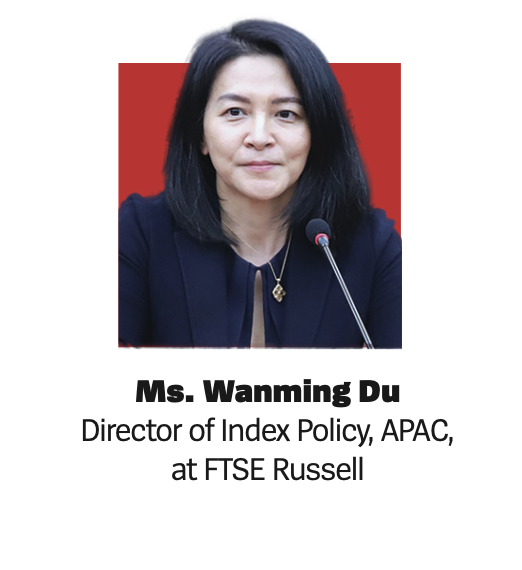
Ms. Wanming Du, Director of Index Policy, APAC, at FTSE Russell
Over the past two years, FTSE Russell has worked closely with Vietnamese regulators and witnessed many reforms aligned with international standards, such as non-pre-funding trading and improved failed-trade handling procedures. We also recognize Vietnam’s detailed roadmap for future developments, including the implementation of a Central Counterparty Clearing mechanism by 2027 and the streamlining of account-opening processes to facilitate foreign investor participation.
Vietnam will be included in index groups with a combined asset scale of hundreds of billions of US dollars. We estimate that the country could attract an additional inflow of about $1-1.5 billion in passive funds and around $4-5 billion in active funds, totaling some $5-6 billion in new capital into the market.
The upgrade process will be carried out in several stages from now until September next year, with the specific number of steps to be decided in March. That will also be when we update our models on how Vietnam enables global brokers to access the domestic market.
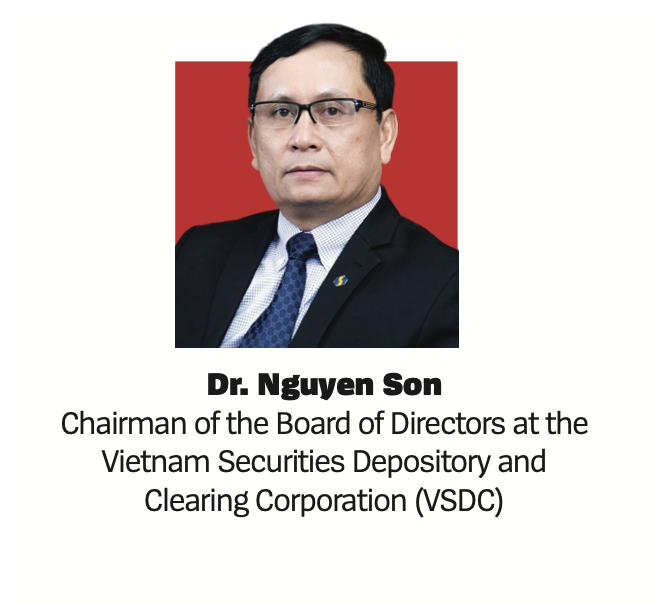
Dr. Nguyen Son, Chairman of the Board of Directors at the Vietnam Securities Depository and Clearing Corporation (VSDC)
To meet the growing demand from international investors and support Vietnam’s stock market upgrade, VSDC is accelerating the modernization of its technological infrastructure to operate on globally-recognized platforms. Such efforts are not merely technical, they also lay the foundation for Vietnam’s capital market to achieve sustainable growth and deeper integration.
VSDC was assigned several key tasks in a recent decision from the Ministry of Finance (MoF). One of the most important is to develop a Straight Through Processing (STP) platform for real-time interaction between custodian banks and securities companies. Since Vietnam allowed foreign investors to trade without 100 per cent pre-funding, the need for automated connections between custodian banks and brokers has become urgent, replacing the current manual communication process.
We are building this interactive platform to enable global custodian banks and domestic securities firms to connect directly and automatically. This is a large-scale technology project requiring close cooperation between securities firms and, in particular, global custodians.
Under an MoF directive, the project must be completed in time for FTSE Russell’s review in March 2026, targeting Vietnam’s official market upgrade on September 21, 2026. Technology providers have indicated that even under the fastest scenario, completion could take until December 2026, creating significant pressure that requires careful planning and strong support from global custodians.
The MoF decision also assigns the VSDC to develop an investment fund information platform to modernize and increase transparency in the country’s fund management industry. VSDC plans to roll out this platform in 2026, including a system for evaluating fund performance over multiple years and recognizing top performers.
Another foundational task is the establishment of a Central Counterparty Clearing (CCP) mechanism. Without a CCP, any transaction failure due to insufficient cash or securities could damage market credibility, especially among foreign investors. A CCP would ensure settlement safety and enhance transparency and stability. VSDC has committed to regulators to implement a CCP roadmap, with Phase 1 (“go-live”) expected in early 2027. It is currently finalizing its proposal to the MoF before formally establishing this new legal entity.
Furthermore, once the KRX trading platform operates stably and the market continues to grow, we will need to expand system capacity, upgrade servers, and integrate features allowed under the investment package, such as short selling, same-day trading, and selling pending securities. The CCP will also be incorporated into this framework, with gradual rollouts based on risk management capacity.
In line with the directives from the government, the MoF, and the State Securities Commission, we will also gradually introduce new products, such as VN100 futures contracts, index options, and other innovative products from HoSE. We will design these systems in parallel - from registration, depository, and clearing processes to connections with payment banks.
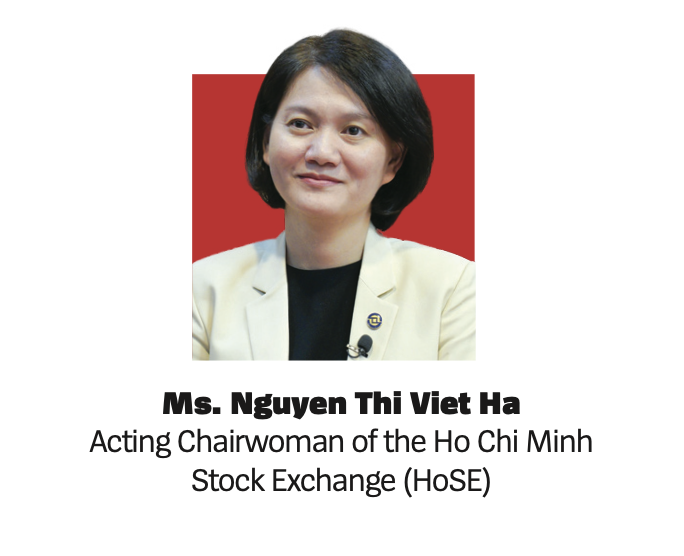
Ms. Nguyen Thi Viet Ha, Acting Chairwoman of the Ho Chi Minh Stock Exchange (HoSE)
With double-digit targets for economic growth in the coming years, the potential inflows of domestic and foreign capital into the market are quite large. Even just $15 billion of domestic capital would be substantial. This primarily requires that our technological infrastructure be capable of handling such demand.
We now have a new system that meets market requirements, but given the market’s pace of growth, HoSE must urgently continue upgrading its IT systems. We also need to improve the quality of listed products. HoSE is constantly striving to innovate and enhance the quality of market offerings, for example promoting ESG [environmental, social, and governance] and sustainable development practices among listed companies. The goal is to bring more high-quality products to the market to meet the needs of both domestic and foreign investors. These are the two major directions for HoSE in the time to come.
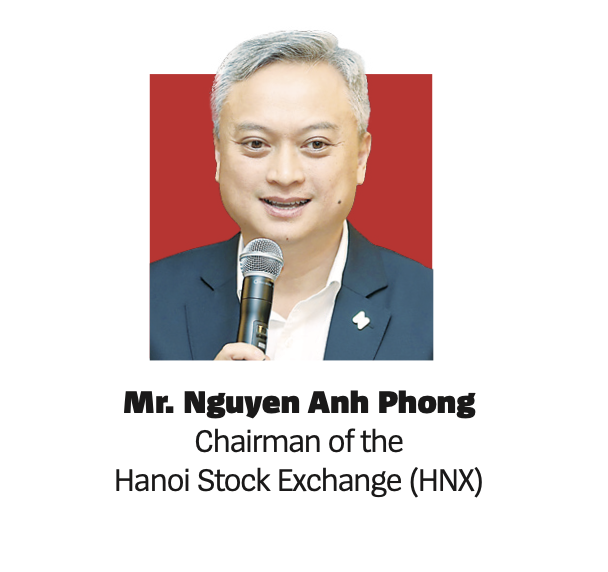
Mr. Nguyen Anh Phong, Chairman of the Hanoi Stock Exchange (HNX)
It is necessary to strengthen support for companies in disclosing information and complying with market regulations. In particular, we must improve English-language disclosure, almost simultaneously with Vietnamese. This will allow foreign investors to access information immediately, contributing to a more open and transparent market.
Beyond promoting both the quantity and quality of the stock market, the bond market also presents challenges and opportunities in the new context and growth space. Government bonds are an important segment as we develop, addressing public debt issues and boosting public investment. HNX is working with the State Treasury to build technological infrastructure to develop the bond market, helping the government mobilize additional resources for economic development. It also plans to improve the yield curve to better reflect market conditions, providing members and investors with a reliable reference.
Regarding the derivatives market, HNX recently launched VN100 futures contracts, a new product offering investors additional options for risk hedging, efficient capital use, and a safe haven during volatile periods. In the coming period, it will continue researching and reporting to the State Securities Commission on introducing index options within 1-2 years, following the development strategy of starting with simple derivatives before gradually introducing more complex products to attract both domestic and international investors.
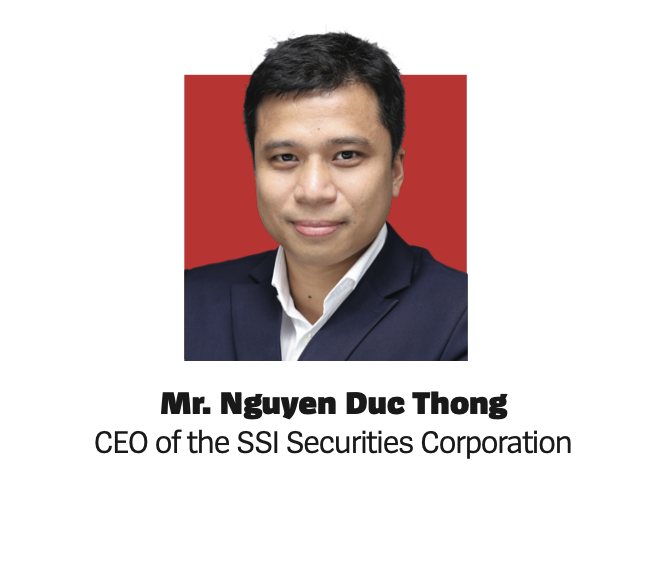
Mr. Nguyen Duc Thong, CEO of the SSI Securities Corporation
Essentially, the supply side of the stock market is still limited. However, we greatly appreciate the efforts of regulators, who have been implementing multiple measures to timely increase market supply.
Regarding solutions to boost supply, in my view, the State Securities Commission should create mechanisms to relax listing criteria for tech companies. Looking at other markets like China and the US, if tech companies were always required to be profitable for two years, there would have been no Apple, Alibaba, or Tencent. Startups need capital most when they are just starting. Therefore, lowering the listing criteria for tech companies would help them resolve funding challenges and gain access to market capital. This is crucial for developing the stock market.
Another point is that we hope regulators will explore and develop more derivatives products to give investors access to new instruments, manage risks, and stimulate demand in the underlying market through derivatives.
Vietnamese investors can come in two clear extremes: those seeking high risk invest in stocks, while those seeking safety use savings. But there is a large middle segment of investors who want moderate safety while accepting some risk. Other Asian markets, such as China, South Korea, and Thailand, and those in Europe offer a variety of prominent products that allow investors to invest with confidence while earning returns.
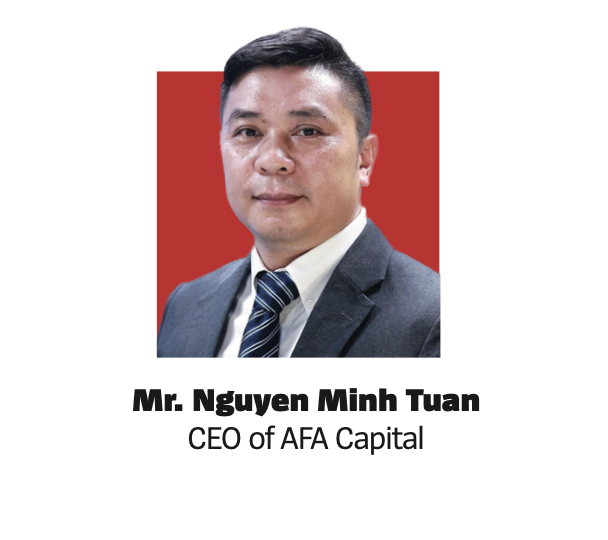
Mr. Nguyen Minh Tuan, CEO of AFA Capital
A large amount of capital will be needed in the next five-year cycle, with GDP growth targets in the double digits. Our monetary policy will certainly need to remain in a loosening cycle to support economic growth. Capital inflows will come largely from domestic sources, and after the market upgrade, foreign investment will add another layer of inflows. However, in terms of supply, our IPO rate is the lowest in Southeast Asia.
My observation is that the stock market today is very similar to the real estate market, with limited supply and primarily high-end segments. On the stock market, most shares are in finance, banking, and real estate, while core manufacturing and technology companies are largely absent. Cyclical products lead to cyclical market development.
Therefore, solutions to address the current stock market challenge focus on increasing the supply of products, including raising the proportion of State-owned enterprise (SOE) equitization and increasing the number of private companies listed. An important factor to accelerate SOE equitization is to minimize valuation risks, which would allow for faster implementation.
For private companies, especially tech firms and innovative startups, there could be a dedicated monitoring framework to provide tailored policies supporting their IPOs. Of course, from an investor perspective, criteria cannot be too low, otherwise investors could easily lose money.
Regarding foreign capital, ownership limits are still in place. It may be worth exploring new products, such as non-voting depository receipts, for certain sectors where we want to retain control.
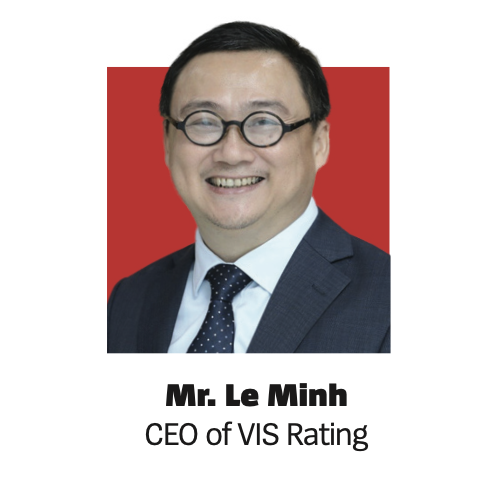
Mr. Le Minh, CEO of VIS Rating
When FTSE Russell approved Vietnam’s stock market upgrade, its upgrade list also included Greece. The decision to upgrade Greece was based on four factors, one of which clearly stated that a key consideration was that its market is currently classified as investment-grade by the three leading global rating agencies: Moody’s, Standard & Poor’s, and Fitch Ratings.
This sends a signal to Vietnam: if the government bond market does not meet investment-grade classification then achieving the next market upgrade will be rather difficult, though the goal remains for MSCI to approve such an upgrade by 2030. A higher market rating would help achieve higher long-term objectives.
Moreover, we believe corporate bonds will play an increasingly important role in the coming years to meet investment capital needs aimed at double-digit GDP growth. Corporate bonds are expected to boom after 2027.
VIS Rating’s research shows that following the 2022 crisis, when many bonds defaulted on interest payments, the market took four years to recover. Calculations indicate that the bond market will enter a new phase by 2027. The State regulator has also established a new legal framework that is more transparent and investor-protective, improving overall bond market quality.
In this collective effort, credit rating agencies act as an “extended arm” of regulators. Previously, the State Securities Commission carried full responsibility for ensuring bond market quality. Now, the “gatekeeping” role has expanded. Maintaining the quality of rating agencies provides an additional layer of protection for both the market and the regulators themselves.

Mr. Gary Harron, Head of Securities Services at HSBC Vietnam
We would like to congratulate Vietnam on this significant milestone, with FTSE Russell confirming the long-awaited reclassification of the stock market from Frontier to Secondary Emerging status. Effective September 21, 2026, and subject to an interim review in March 2026, the upgrade represents another example of how the country’s rising global profile can withstand near-term challenges. The new status recognizes years of coordinated efforts by the government, regulators, and market participants.
For Vietnam, shedding the Frontier label could profoundly reshape investor behavior and confidence, altering the trajectory of its long-term economic development and reducing dependence on any single trading partner. HSBC Global Investment Research suggests that potential foreign inflows could eventually range between $3.4 billion and $10.4 billion from active and passive funds following the inclusion.
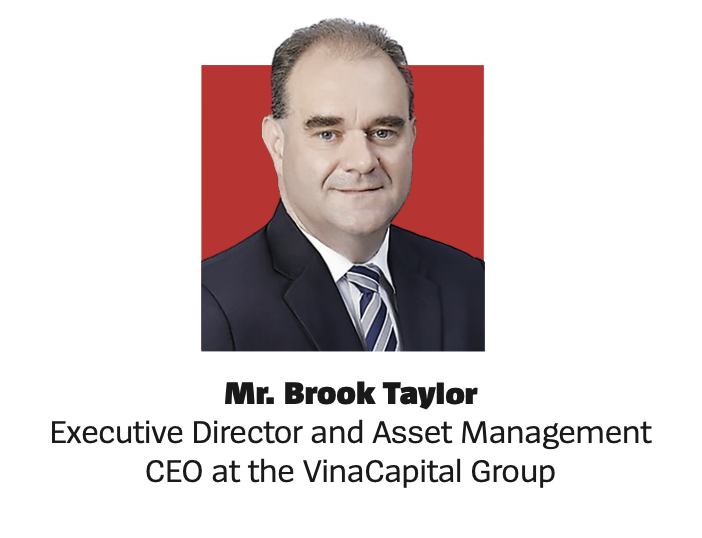
Mr. Brook Taylor, Executive Director and Asset Management CEO at the VinaCapital Group
FTSE Russell’s upgrade to Emerging Market status could attract around $5-$6 billion in investment into Vietnam. We believe that inflows will not flood the market all at once, but having these investment flows represents a meaningful and positive turning point for the market.
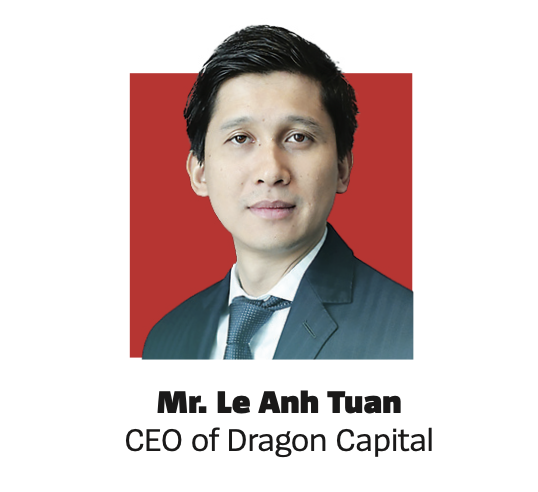
Mr. Le Anh Tuan, CEO of Dragon Capital
I see this as a very important step, because before moving to the Emerging Market category, Vietnam was classified as a Frontier market. Frontier markets are virtually ignored by investors. Therefore, joining the Emerging Market category is vital. It is extremely important for Vietnam to enter the global playing field.








 Google translate
Google translate